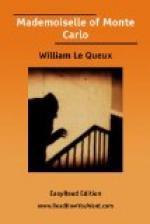“Of course. But I agree we must fix the guilt upon old Cataldi. He almost as good as admitted it by his face when I taxed him with it. Why not give him away to the Nice police?”
“No, not yet. Certainly not,” exclaimed Howell.
“It’s a pity The Sparrow does not know about the Henfrey business. He might help us. Dare we tell him? What do you think?”
“Tell him! Good Heavens! No! Surely you are fully aware how he always sets his face against any attempt upon human life, and no one who has taken life has ever had his forgiveness,” said Howell. “The Sparrow is our master—a fine and marvellous mind which has no equal in Europe. If he had gone into politics he could have been the greatest statesman of the age. But he is Il Passero, the man who directs affairs of every kind, and the man at the helm of every great enterprise. Yet his one fixed motto is that life shall not be taken.”
“But in old Henfrey’s case we acted upon our own initiative,” remarked Benton.
“Yes. Yours was a wonderfully well-conceived idea. And all worked without a hitch until young Henfrey’s visit to Monte Carlo, and his affection for that girl Ranscomb.”
“We are weaning him away from her,” Benton said. “At last the girl’s suspicions are excited, and there is just that little disagreement which, broadening, leads to the open breach. Oh! my dear Howell, how could you and I live if it were not for that silly infection called love? In our profession love is all-conquering. Without it we could make no progress, no smart coups, no conquests of women who afterwards shed out to us money which at the assizes they would designate by the ugly word ‘blackmail.’”
“Ah! Charles. You were always a philosopher,” laughed his companion—the man who was a bosom friend of The Sparrow. “But it carries us no nearer. We must, at all costs, fix the hand that shot Yvonne.”
“Giulio shot her—without a doubt!” was Benton’s quick reply.
They were standing together on the kerb outside the Tube station at Piccadilly Circus as Benton uttered the words.
“Well, my dear fellow, then let us prove it,” said Howell. “But not yet, remember. We must first see how it goes with Molly. She must be watched carefully. Of course, I agree that Giulio Cataldi shot Yvonne. Later we will prove that fact, but the worst of it is that the French police are hot on the track of young Henfrey.”
“How do you know that?” asked his companion quickly.
“Well,” he answered, after a second’s hesitation, “I heard so two days ago.”
Then Howell, pleading an urgent meeting with a mutual friend, also a crook like themselves, grasped the other’s hand, and they parted.
TWENTY-SIXTH CHAPTER
LISETTE’S DISCLOSURES
At ten o’clock on the morning that Hugh Henfrey left Avignon for Paris, The Sparrow stood at the window of his cozy little flat in the Rue des Petits Champs, where he was known to his elderly housekeeper—a worthy old soul from Yvetot, in the north—as Guillaume Gautier.




